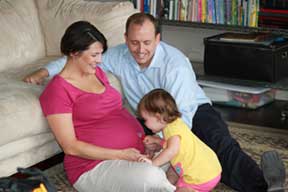Record High Cases of Whooping Cough -- Vaccinate to Protect

Whooping cough can take a toll on anyone, but it can be deadly for young children. Today, there are cases in every state, and the country is on track to have the most reported cases since 1959. From January through September 2012, about 30,000 cases of whooping cough were reported, along with 14 deaths. Most of those deaths were among babies younger than three months old. How can you protect yourself and help keep babies safe?
Protection can start before a baby is even born. Pregnant moms should get a Tdap vaccine, which is a booster shot combining protection against whooping cough, tetanus and diphtheria. She'll be protecting herself so she won't spread whooping cough to her newborn, and some protection will be passed on to her baby.
The Centers for Disease Control and Prevention (CDC) also recommends that anyone around babies get the whooping cough vaccine at least two weeks before coming into close contact with an infant. In fact, every adult is recommended one dose of Tdap to protect themselves, even if they're not going to be around babies. During pregnancy, moms should talk to others about getting the Tdap vaccine. This includes her spouse, grandparents, siblings, aunts, uncles, cousins, babysitters and day care staff.
After the baby arrives, he'll get his first dose of DTaP (the childhood vaccine combining protection against whooping cough, tetanus and diphtheria) at two months of age. He should complete the vaccine series by getting additional doses at 4 months, 6 months, 15 through 18 months and 4 through 6 years of age. Since the protection the DTaP vaccine provides young children decreases over time, preteens need the Tdap booster shot at 11 or 12 years old.
Now is the time to do your part to protect yourself -- and babies, too. Visit www.cdc.gov/pertussis for more information, and talk to a doctor about the whooping cough vaccine today.

No comments: